Teahouses have become synonymous with the Everest Base Camp Trek and with trekking in the Himalayas in general.
To those not familiar with the term, tea houses are not so much houses that serve tea, but are rather small bed-and-breakfast-like hotels that are dotted along most of the treks in the region.
They are the most popular form of accommodation for travellers to the Everest region as they provide an easy, pay-as-you-stay approach to trekking in one of the highest areas of the world.
‘Tea House Trekking’ as it is aptly named, involves trekking most of the day for 5-7 hours, starting and ending in the small Sherpa towns along the routes where the various tea houses are located. They are easily identifiable by the large signs outside their doors reading ‘tea and coffee’, ‘hot showers here’ and ‘we have electricity’.
The typical tea house will provide all the basic amenities needed for comfortable, yet humble approach to trekking in the Himalayas. A single bed, a hot meal, the option of a hot shower and some electricity are what is to be expected when staying in the iconic tea houses.
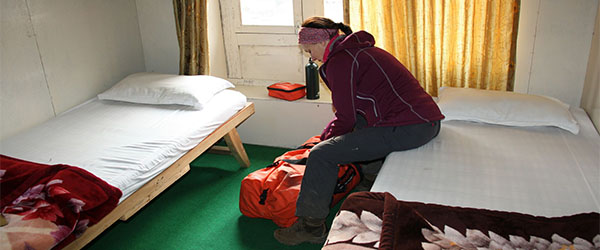
We highly recommend ‘tea house trekking’ as it exposes you to the local people, who are very accommodating and friendly. It also shows you a side of Nepal that you may not see if you decided to camp by yourself as well as providing the opportunity to meet like-minded trekkers!
EBC Trek Teahouses
Tea House Facilities – Toilets, Showers and Communal Areas
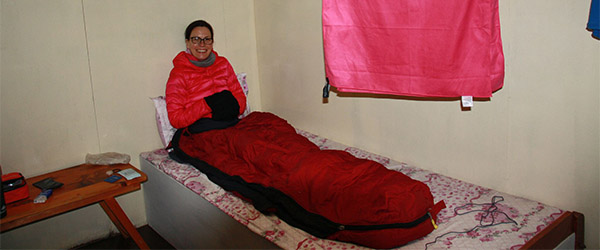
It must be stated that not all tea houses are the same, so differences in quality are generally quite marked, especially as you change from the lower altitude towns to those up at high altitudes. The incidence of tea houses will also vary according to the popularity of the trek you are on.
The Everest Base Camp Trek and its variants are very popular, attracting over 30,000 visitors annually, so there are many tea houses along the its trails, most of which will be reliable.
On popular treks and at lower altitudes most tea houses will have flush toilets and hot water showers, usually at a cost of around US$ 4. As you move higher up the trail, toilets will start to become manual flushing toilets (using a bucket) and eventually long drops.
The scarcity of hot water also increases with altitude, so most tea houses will offer a pot of warm water, heated by a fire, with which to wash yourself.
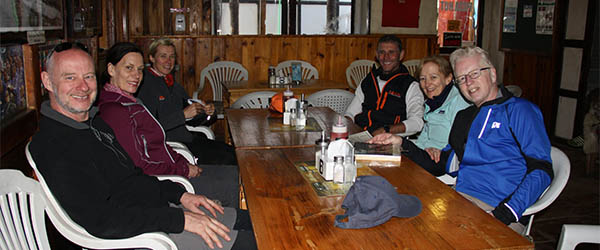
The communal area in tea houses tends to be the dining room, in the centre of which will be a large yak dung burning stove to heat the whole house. This is a great spot to socialise with fellow climbers or just to revel in the heat that the stove provides!
The typical price of a night in a tea house will vary on different treks and at different altitudes. Expect to pay between US$ 5-10 for a well-equipped, trusted tea house per night. If you decide to travel with a tour operator or with a guide/porter, they will usually organise the tea house accommodation in advance and will include it in their trip package.
Here is a great video diary by Eva zu Beck on EBC teahouses.
Read our detailed article on costs for more information.
EBC Trek Teahouses
Tea House Facilities – Rooms, Electricity and Wi-Fi
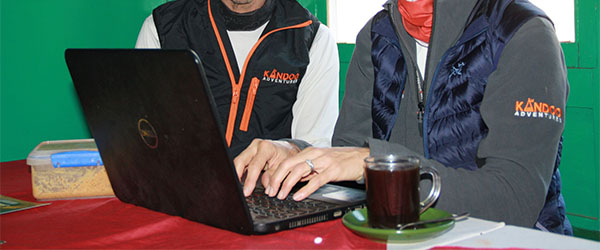
Almost all tea houses offer twin rooms – two single beds about 1m apart with a small bedside table in between. There will be a pillow, sheets and bed cover included, but we recommend using your sleeping bag or a pillow liner for hygiene reasons. The sleeping bag can also come in handy as the nights get very cold, especially higher up in the mountains. Using ear plugs would also be a smart choice as the walls are very thin and not well insulated. For more information on all the gear you should pack, read our Everest Packing List.
Most tea houses have electricity for lighting as well as for a few plug points, usually located in the communal areas. They will charge US$ 3-5 per hour for the use of the plug points, which are typically in high demand – especially in the busier tea houses.
Some tea houses will have internet access and offer Wi-Fi hotspots at a charge. These are usually unreliable and not all tea houses will have connections, so we recommend purchasing a 3G sim card to use for the duration of your journey. Mobile connectivity is very good in the entire region and the prices are affordable. Read our article on internet connectivity on the Everest Base Camp Trek to find out more.
EBC Trek Teahouses
Tea House Facilities – Food
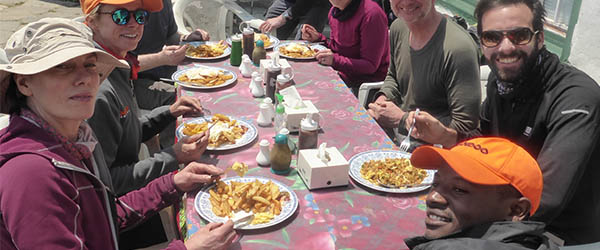
The benefit of using tea houses when on one of the more popular treks is that you don’t have to worry about regular meals and carrying hiking food. All tea houses will provide a variety of hot meals, prepared on-site and made with love! Unfortunately, there is not much choice, as the meals tend to be varieties of each other, with a few changed ingredients.
As all ingredients have to be flown into Lukla then carried up the mountain by yaks or porters, meals will tend to be dominated by flour and cereal products. Bread, porridge, beans, rice and dumplings are the staples of any meal. These will be served with vegetables, usually lentils, to form what is the national dish of Nepal – Dal Bhat.
We recommend staying away from meat dishes as they tend not to be fresh, and therefore safe for consumption. In accordance with the religious beliefs of the Sherpas, no animals are to be slaughtered in the mountains, so all meat products are carried up to the tea houses by foot – often over many days.
Stick to the traditional rice and vegetable variations, vegetable soups and eggs in the morning and you should be safe and well-nourished to tackle whatever pass or peak lies before you that day! For a detailed look into food on the Everest Base Camp Trek, read our article here.
EBC Trek Teahouses
General Tips
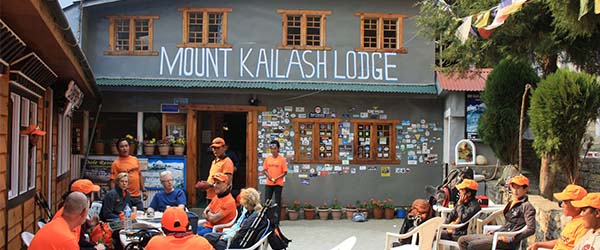
We recommend using tour operators, as they will have the advantage of knowing which tea houses are the best and will be able to book your rooms in advance. If you intend to trek without guides, make sure you arrive at your tea house before 7pm to be sure that there is still food being served and enough beds free for your group.
To ensure you stay in reliable tea houses, stick to the popular routes and ask fellow trekkers where they are staying.
Finally, take extra precaution in the tea houses as they are not world renown for their levels of hygiene! Bring a pillow cover, use your sleeping bag and stay away from meat to ensure you have a happy trek.

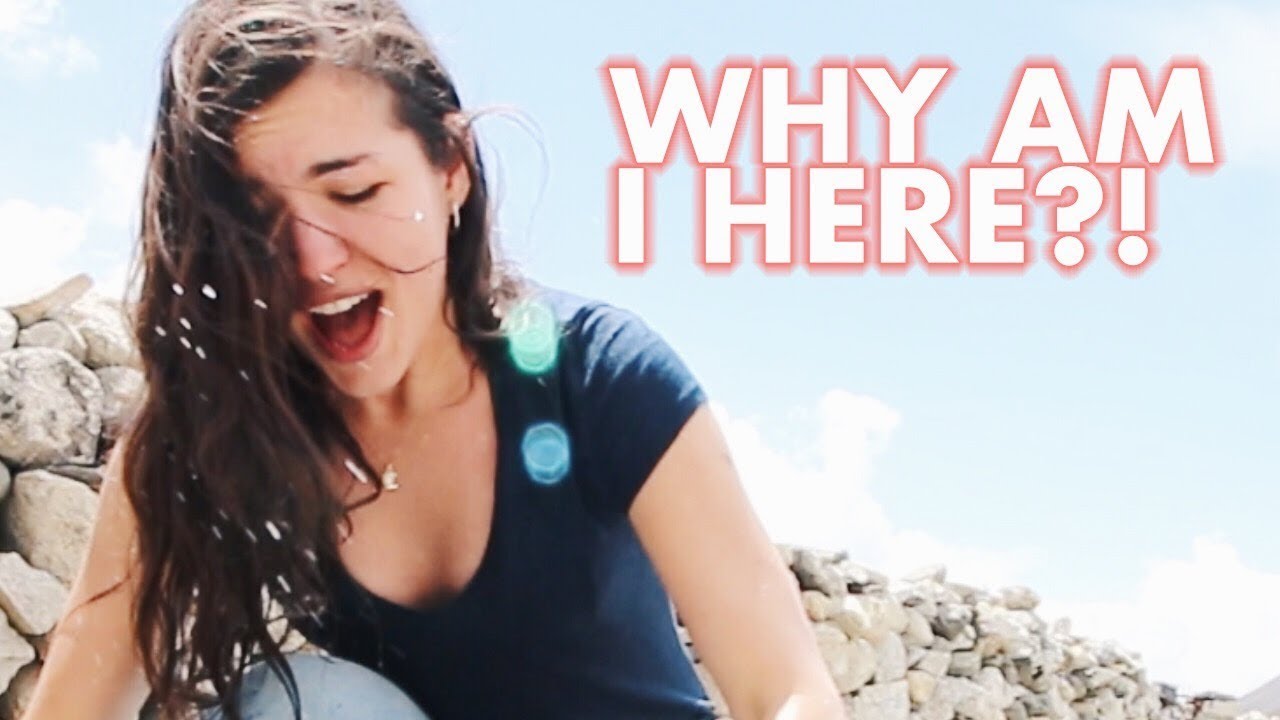
Hello, I have two questions:
1. I want to do the base camp trek alone in October this year. Do you have to book the overnight stay in the tea houses in advance? Or is there always somewhere to sleep?
2. If I decide to fly from Gorak Shep to Lukla by helicopter on the way back, is it possible to find a flight without making a reservation in advance?
Thank you very much
Martin
Hi Martin, in terms of question 1, yes, you can usually find a place to sleep on arrival, but it’s advisable to take a porter to go ahead of you each day to secure your spot in a teahouse. Regarding question 2, I would try to arrange this in KTM before you start your trek.
Good morning Mark
Have a question about sleeping bags. I don't want to carry them from here. What's your advice on renting sleeping bags?
TIA
Hi Minni, it’s pretty easy to rent a sleeping bag from your local tour company or indeed from one of the gear shops in Thamel.
Hi Mark,
Your blog is very informative. Good job.
I am planning to do the EBC trek solo in March 2024. Will the trails be snowy at that time? Will the weather have a high probability of being clear most of the days?
One more thing. Do I need to pre book the tea houses or I can just reach there and make bookings on spot? If I need to pre book can you please share some contact details of tea house owners there?
Hi Palash, the weather should be pretty good in March. Teahouses can be pre-book. Usually hikers take a guide or porter who can arrange the bookings for you in advance each day. Unfortunately I don’t have the contact details of all the teahouses.
Hi, I'm Mrinal from India. I'm planning to do EBC plus Gokyo trek in April 2023. Could you pls share with me contact details of local guide. Thanks 🙂
Hi, get connected with a local guide here: https://ebctrekguide.com/go
Hi
Are we able to hike during Christmas through the first wk of January?
I understand temperature will be around-15 during the day and -20 or more at night.
Are there snow storms?
If there are, do we wait at the tea house until it’s over?
Does the tea houses in the higher altitudes have wood fire heater that heats up the bed room since the temperature is -20 outside?
Hi Herman, temperatures are very cold in January but it’s possible to still hike. Almost all teahouses have no heating in the bedrooms so you will need to bring a very warm 4-season sleeping bag. There will be a yak burner stove in the common area that provides some heat.
Hi Mark, very informative article. As we plan for EBC trek in October this year we have couple of questions. The tour operator said they will provide 4 hot showers on the trek and at times we might have to share bathrooms. Don't all the rooms at a teahouse come with attached bathrooms? Do most of the teahouses have hot shower facilities? Thanks in advance!
Prasad Koneru
Hi Prasad, most of the teahouses on the EBC route are very basic. Apart from a few a Namche Bazaar, teahouses generally have shared bathroom facilities. These range from basic to rudimentary. They generally get more basic the higher you go. Hot showers are available in a few teahouses, and you generally pay the teahouse to use these. It is more common to pay for a bowl of water, which you can use to wet wipe yourself. In general, expect very basic facilities once you get above Namche Bazaar.
Hi, I understand that teahouses are $15-$20 per night per person. How much are meals per person? Breakfast, lunch and dinner? Thanks!
Hi Lisa, meals range from $2-$10. Cheers!
Hi- A friend and I are planning on booking a 4-day Island Peak climb out of Chukkung in May, but will be trekking independently to get there. I understand that this would be peak season and the Teahouses get booked pretty fast. From reading the comments, it sounds like you should be able to hire the services of a porter to scout ahead and book a room for the upcoming night or 2.
I have a few logistical questions. 1) Are porters readily available in Phadking, Namche Bazaar, Tengboche, and Dingboche to trek ahead and book your room? 2) Do teahouses require payment first to book? I’d like to avoid carrying my own tent if possible.
Has anyone else experienced these logistics before?
Thanks,
Hi Jeremy, yes, porters are readily available in all these towns, although you will have the best chance to get a good porter in Namche. Teahouse usually don’t require prepayment. You can can pay on arrival or sometimes even on departure. Hope this helps!
Hi Mark,
I really appreciate that info! You mention about getting a good porter out of Namche. What are some things to look for when vetting for a good porter to utilize on the trail?
Hi Jeremy, that’s difficult to answer, but generally if the porter has an okay command of English that’s a good sign. And then getting a recommendation from a tea house is also a good shout. Ask around for recommendations from people who seem trustworthy – i.e. teahouse owners, shop owners in Namche etc.
Hi Mark,
I am planning on hiking up the EBC route starting November 15 and then going over Cho La and Renjo Pass, weather permitting. I am planning on doing so independently without booking any accommodation, so here is my question: are the last two weeks of November still considered high season with tea houses being fully booked?
Thank you very much for your help.
Hi Paul, it can be quite busy in November but you should be able to find tea house availability throughout the trek.
Mark
I’m planning on doing the EBC this Oct, any issues with flying drones (permits etc) n will there be easy access to charging them at any tea house, appreciate the info. cheers
Hi Terry, the rules on drones constantly change, as does enforcement. Officially I think drones are not permitted without a licence, but I’m nkot sure how hard this is enforced.
Hi Mark. My husband and I plan to go to Solo trek smack in the middle of October. Are the leeches gone at this time? Also do you have an article on helping with the itinerary? Meaning which is the first day stop to the second stop and what days are acclimatization and so forth? Also can u rent sleeping bags and just bring a liner for when in the tea house? Great article by the way. I found it to be very informative!
Hi Jenn, thanks for getting in touch. Leaches are not really an issue in the Everest region (except during the monsoon season). You shouldn’t see any leeches in October unless you go venturing into the deep undergrowth. In terms of an itinerary see: https://ebctrekguide.com/. Renting sleeping bags is common and easy to do in Kathmandu. The best place to start is in Thamel. Hope this helps!
Good morning. I plan to go EBC at the end of June 2019. How is the weather like that time? Is the raining season started yet? Thanks.
Hi Nhu, unfortunately the end of June is well into the monsoon season and not a great time to trek. If you can move your dates to early or later in the year then you can avoid the rainy season (June-August)
Good morning,
I am planning a solo trip in october and will be staying in bunkhouses,When I get to base camp where can I spend the night ,Or will I need to bring a tent.
Kind regards
Malcolm
Hi Malcolm, all trekkers stay in the little town about 1 hour south of EBC called Goark Shep. There are a number of teahouse in this town. The only way to stay the night in EBC is to find an agency with connections to climbing teams, and then arrange a night in EBC on their permit.
Hey Mark, really useful information, thanks. I am planning to hike to Everest in June 2019 and will be self hiking without a guide. I am concerned about booking the tea houses along the way and wondered if there is a company you can recommend that will just book these for me if I give them my itinerary?
My other question is, on reaching Base Camp, would I need to provide my own tent etc, or are there tents you can hire as a treker for one or two nights?
Thanks in advance
Nick
Hi Nick, I’m not aware of any company that can pre-booked teahouses. Most companies book teahouses on the day of travel as they use porters to charge ahead and make these bookings, you may want to hire the services of a guide or porter to do this for you. In terms of base camp, most trekkers do not sleep here. In fact, it is really difficult to arrange an overnight stay at base camp itself. To do so you will most likely need to engage the services of a company or very well connected guide that can get a you sleeping tent with one of the Everest expedition teams. Almost all trekkers sleep at one of the teahouses in Gorak Shep (which is about an hours hike from EBC).
How busy is it likely to be in mid dec-early jan on the gokyo and EBC trekking routes in terms of tea houses? Do I need to book in advance (I am picking this isnt an option!) also can i pick up a guide for cho la further up the trail? Is it ok to go to gokyo first over the pass then into EBC? I was thinking to get a guide just for the cho la section?
Hi Kerensa, Dec-Jan are quiet months so pre-booking teahouses is not necessary. As for getting a guide for the Cho la Pass, this is a good idea. You should be able to find someone in Gokyo who can help, but this is not guaranteed. Please also note, that the pass may be closed due to inclement weather / snow cover. Going via Gokyo to EBC is a standard route so no problem here. All the best!
Hi, I am doing the trek solo in May as well. I was just wondering if I have to book in advance for the teahouses or do I just show up with cash? Do they accept american?
Hi Ashley, May is a busy month so some teahouses may be fully booked but generally you can find a bed in most villages. It may be worth emplying the services of a porter to run ahead and make a booking for you each day. In terms of payment, cash is preferred. It is unlikely any teahouse will accept card.
HI. Do you have an idea what the tea houses charge per night. I will be doing a solo trip and want to ensure i have enough cash with me.
Hi Dawood, prices vary from teahouse to teahouse. The cheapest teahouses are around $7-10 a night. On average, I would say they are $15-$20 a night.
Hi – I’m doing the EBC Trek via Goyko in Oct/Nov 2018. Do you know if there are any book shops in Namche or book swaps in any of the tea houses en route (English novels) to save me taking books (I don’t have a kindle).
Thanks.
Kim
Hi Kim, many tea houses have a small selection of books available in them. I’m sure some will be receptive to swapping books.